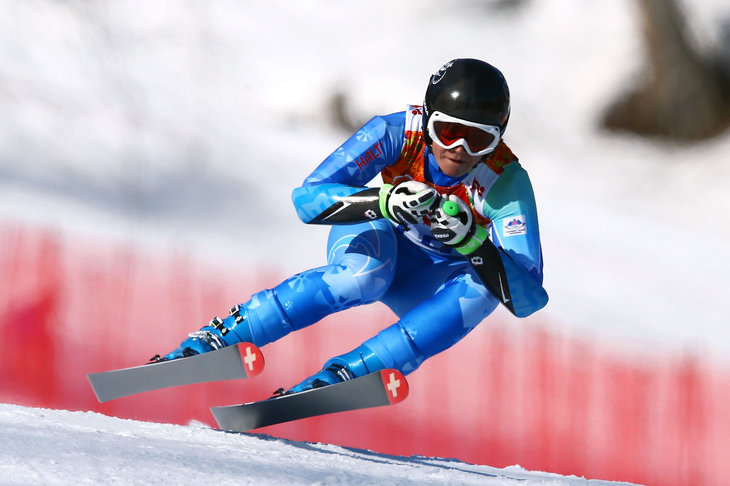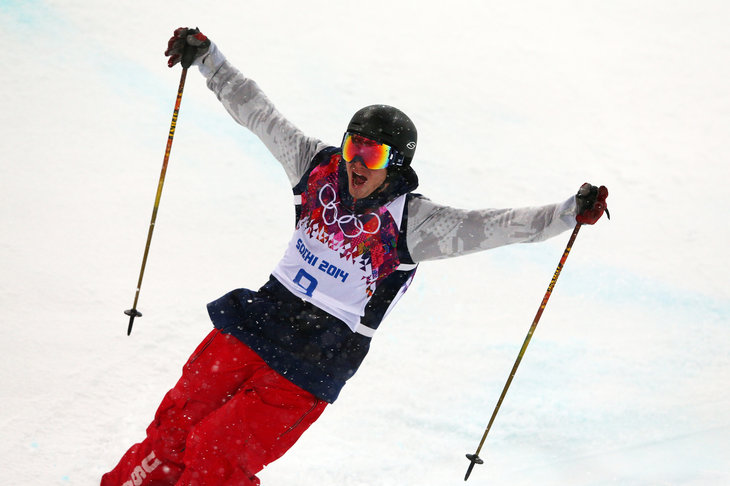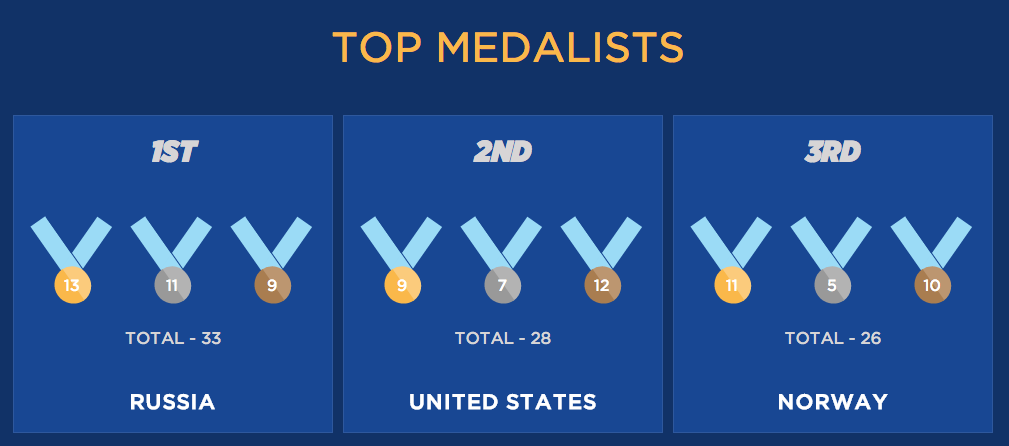
Cross country skiing is like most sports in the Olympics, and creating your own alternate history: It's a thing you can't do, but still want to very badly.
Sweden won gold in a sport they should be good at this past weekend: cross-country skiing. As a discipline it is lonely as hell, requires a ton of snow and the mindset of someone who wants, nay needs to spend all day slushing through the woods by themselves. The event can be one of pursuit: steady, dogged pursuit through a cold, abandoned landscape of trees, ice, snow and the incongruous appearance of a packed grandstand and stadium at the end. It relies on someone being willing to go into the woods alone to hunt someone else, hang on their tracks for up to 50 kilometers or so, and to overtake them in a mad rush on the final one hundred meters of the race.
It's almost -- almost -- like hunting another person, or being hunted by another person, a tedious lunacy ended only by the fatality of the finish line. It builds like The Most Dangerous Game, too. Watching cross-country works like a long tracking shot, one you can let your focus wander around a bit before coming back to the clock, and the little numbers in the corner of the screen letting you know how doomed the leader or pursuer may be. The greatest attractor is the curve of the moment itself, the gradual flow of the chase down to the stadium and the ruts leading to the finish line, and that last, desperate lunge and mass collapse at the line.
On the final leg of the women's 4x5 kilometer relay this weekend in Sochi, the little differential number for the Swedish women's team was 25 seconds, well behind the Finns and Germans at the lead. Charlotte Kalla of Sweden blew through the final 5K of the race at a suicidal pace, overcame both the Finns and German on the last stretch, and like everyone else does at the finish line, flopped across the line and onto the snow, exhausted, spent and indistinguishable from someone shot at a great distance by a sniper.
Looking at the photo, it's hard to tell whether something really good or really bad just happened.
The Winter Olympics feature so many things you could not, even for a nanosecond, consider doing, ever. You could not consider doing them for reasons of grace and athleticism, like figure skating or ice dancing; you could not consider doing them because of deficiencies of strength, coordination and speed, as with professional hockey or speed skating. You might be too sane to ski-jump, run a proper downhill course or throw yourself down a skeleton course. You thought about it, and ran the simulations. They weren't pretty, and people might have died.
The two real cult classics of the Winter Games have consistently been cross-country skiing and curling, two sports sharing the illusory appeal of not looking totally impossible for the viewer watching along at home. Curling is just throwing a rock down the ice like you're playing a giant game of table shuffleboard, and cross-country skiing is just fast alpine trudging, and you could do both of those things. You could do both of them without skipping face-first down a mountain like Daito Takahashi, or riding upside down in a tiny, frail bullet train of a bobsled like the Brazilian women's bobsled team.
You'd be terrible at both of them, sure. But you wouldn't die, and you might even show some small degree of aptitude. With cross-country skiing, the thought isn't about how hard it actually is -- skiers can go up to 35 miles an hour, take sharp turns on impossibly narrow racing skis and grievously injure themselves flying off the course -- but how it is a sport of average mechanics matched with inhuman endurance. More than anything else, cross-country skiers endure, and then make good on that survival by finishing what they started and collapsing in a destroyed heap when it's over.
I never decided on what kind of Scandinavian to be. Being Swedish is like being Scandinavian Plus, and requires instructional videos. This is not a joke: some relatives of mine in the State Department watched Swedish videos made for foreigners about interacting with Swedes, most of which focused on situations where the Swedes found casual interaction to be rude. Per the videos, these situations included pretty much every daily social situation, and meeting people in Sweden is hard.
Denmark's a little too close to Germany, and Iceland's just a little too far from everything. Finland might not even be Scandinavian in anything but geography, and might not be anything other than Finland, a separate dimension of taciturn people born with the ability to steer rally cars on icy roads through dense forests at 120 miles per hour and go weeks without saying anything at all. Finns scare Russians, and I'm not sure if I want to live that far over on the spectrum of personally terrifying nationalities.
I've got time to decide. Everyone does when considering the second country they're going to be from, the place where they really belong, the place where, after 12 very scientific questions are answered, an internet quiz tells you to call your spiritual home. This place usually accentuates or flatters your favorite things you'd like to be, and rarely highlights the bad, the irregular, or the disastrous. This place is usually in Europe and it is never somewhere like Congo (Brazzaville), because your secret homeland is never, ever a place that is actually hard to live in.
Your mom has one: per Steve Hely's How I Became A Famous Novelist, it's probably Italy, and in particular Tuscany because Americans just trust anything with the word Tuscan in front of it even if they have no idea what it means. For your dad, it might be some place tropical where no one speaks his language, and there's a beach, and no one can talk to him while he reads books about World War Two, drinks and slowly collects a manageable case of skin cancer.
For me, it's somewhere in Scandinavia where things are orderly, people don't talk much and the winter lasts eight months and swallows up everything around it, forcing people to live in the misery of the cold, to push through it and eventually to survive by floating along atop it as endurance athletes of the soul bent on finishing, enduring and pushing through to a brief, glorious spring. And if you took it a step further, Charlotte Kalla would be the personification of that thing, the thing the Finns call sisu. It is a resilience transcending any adversity including defeat, the snow, the Russians, the horrible winters or isolation. It carries through, and finishes no matter the cost.
This is all an old but reliable lie: escapism, stuck among a lot of smaller lies like that being Scandinavian makes the basic facts of life any easier, or that living in darkness in winter is any more bearable for them, or that they might not all spend their days like Ricky Bruch eating piles of vitamins and lifting barbells in well-appointed Stockholm gyms. I want them to, of course, for my own purposes, just like I want all of Russian life to happen on dashcam, and to imagine that every wedding party in Australia features at least one talking crocodile who also is the town treasurer. It's more fun to think of the world that way, particularly when you think that somewhere, perhaps, the Sorting Hat might have made a mistake, and that you could have been a better, more impressive human there.
None of that even comes close to a semblance of how things actually work. If I were being honest and thinking in terms of compatibility, my secret homeland would be someplace hot, disorderly, and horrible located nowhere near Scandinavia. (Think "someplace run through during a chase scene in True Detective," and not "Oslo.") Picking your second home is never about honesty, though, and neither was watching Charlotte Kalla blast across the finish line into a heap of victorious gasping. For the audience, sports are still about desire -- a thing most often about the things you don't and possibly can never have or be, but still want so very badly.
More on the Winter Olympics:
• SB Nation's Winter Olympics medal tracker | Meet Team USA
• Norway loses in curling, and the pants are gone
• Ski jumper loses ski, crashes hard | #Lookit
• Remembering the 1980 Miracle on Ice | Longform: Team USA's disaster in 1984
• Hockey:Men’s schedule | All 12 men’s rosters | USA roster analysis




